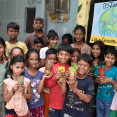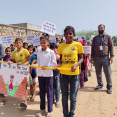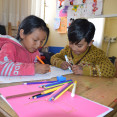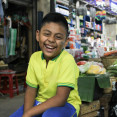
The adoption of the Sustainable Development Goals by the United Nations General Assembly in 2015 placed birth registration firmly on the international development agenda. The goals include a dedicated target to provide legal identity for all, including birth registration, by 2030, and call for support in building the statistical capacity needed for strong national civil registration systems.
Although there has been some positive progress since the adoption of the goals, according to a recent report published by UNICEF, globally 150 million children remain unregistered.
Drawing from over 500 data sources over a twenty-year period, UNICEF's ‘The Right Start in Life: Global Levels and Trends in Birth Registration’ report presents updated global and regional estimates of the number of unregistered children under five. Findings from the report show that the births of around two in ten of the world’s children are not registered, and three in ten children do not have a birth certificate.
Poverty remains a key factor determining whether a child is registered at birth, with the report highlighting that globally children from the poorest 20% of households are 25% less likely to be registered at birth than children from the richest 20%. Children from marginalised groups, including ethnic minorities, indigenous communities, single parent households and other vulnerable groups are all also less likely to be registered. The report also finds that in order to achieve the set Sustainable Development Goals by 2030, progress needs to be at least five times faster.
Naomi Hall Opiyo, Director of International Programmes and Impact at Toybox, shares her thoughts on the findings of the report:
“Here at Toybox, we are pleased to see the global issue of birth registration in the spotlight. Supporting vulnerable children and families to access their birth certificates and advocating for simpler processes for children in street situations to be registered remains a key priority for us. Toybox is immensely proud that we have been part of the progress made towards universal birth registration in recent years. Over the past 11 years, over 13,000 children and young people across three continents have been supported by Toybox and our local partners to obtain their birth certificates. Despite all that has been achieved in this time, as highlighted by the recent report from UNICEF, there is still so much more to do."
Pictured below: (Left) With the support of Toybox's partner Fundación Alalay in Bolivia, 12-year-old Sergio receives his birth certificate. (Right) Nine-year-old Anita is now able to go to school, after being supported by Toybox's partner, SathSath in Nepal. She shares, "My teacher had asked me to bring my birth certificate and said that without it, I would not be able to continue school."


Barriers to registration
Despite the right to identity being a universal human right, in many countries where Toybox works, there are fees to obtain a birth certificate. These fees, as well as processing times, typically increase the longer the period after a birth takes place. Even in countries where registration is free, there are often hidden costs which need to be taken into consideration - such as travel costs, or the loss of income families experience when they take time away from their income-generating activities. Street children and families, many of whom live a hand to mouth existence each day, are forced to use what little they earn on basic survival, and registration is not prioritised. While 'The Right Start in Life' focuses it's research on children under five, most of the children and young people Toybox supports are older than this. This means their birth registrations are often much more expensive, and more complex, to obtain.
Along with the costs involved, another key barrier to universal birth registration the report highlights is lack of knowledge, with over 50% of the caregivers of unregistered children interviewed commenting that they do not understand the process required to register their child. This is consistent with the reality in the contexts where Toybox's partners work, where a particular challenge is the two-stage registration process and the false belief held by many that completing the first step (such as notifying a chief or church elder of a birth or obtaining a confirmation of birth document from hospital) means a child is officially registered.
One of the ways Toybox and our local partners are addressing this is through targeted awareness-raising campaigns among individuals, families, schools and health staff on the importance of birth registration and identity rights, as well as educating communities on the process and requirements involved and where to access appropriate support.
As children and families in street situations face additional obstacles as more countries move to online forms being a mandatory part of the registration process, our partners are also supporting those who do not have access to the internet to navigate online applications from their offices.
Pictured below: A young boy waits to have his photo taken for his ID card, during a mass registration day, organised by Toybox's partner Alalay.
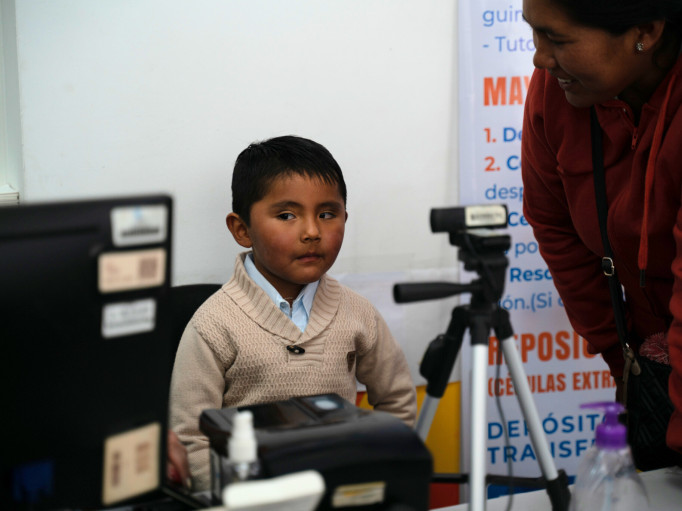
Making registration accessible to all
One of the recommendations 'The Right Start in Life' report outlines is the need for decentralisation of registration services in order to make registration more accessible by bringing it closer to communities. They also call for advocacy for greater engagement and buy in from both civil registration authorities and the Ministry of Health.
In Guatemala, Toybox has been supporting our local partner CONACMI and RENAP (the Civil Registration Department) in a pilot project focused on increasing registration at birth, particularly among marginalised communities. This has been through the development of a mobile app which enables community midwives to log initial information after a birth which is linked to the registration system. This is then followed up to ensure the second stage of registration happens in a timely manner. The project, of which the Ministry of Health is also a key stakeholder, will soon move into the second phase of scale-up, aiming to reach more areas, more midwives and potentially some local hospitals.
In Kenya, alongside our local partner Pendekezo Letu, Toybox is supporting a mobile registration clinic which is helping young people in street situations to obtain identity documents. At the clinic, local chiefs and civil registration officers guide young people and caregivers through the process - vetting and processing their information. Through our partnership with Pendekezo Letu, last year 651 children and young people were able to access their birth certificates, and 131 were able to obtain other legal documents (such as ID cards).
In line with UNICEF’s findings that more than half of the world's unregistered children live in Sub-Saharan Africa (predominantly in East Africa), our birth registration work in this region remains a priority. Recently, we have also expanded our efforts into Ethiopia, where currently only one in four children under five are registered.
Pictured below: (Left) A young woman in Nairobi supported by Pendekezo Letu poses with her national identity card. (Right) A mass registration day organised by Toybox's partner CONACMI in Peten, Northern Guatemala.


The role of Governments in ensuring universal birth registration
Since birth registration is an essential prerequisite for legal identity and a passport to lifelong protection, Toybox will continue to focus on this critical aspect of our work across our projects around the world. We know that when a child is registered, they are less likely to experience rights violations and denial of essential services. But we cannot do this work alone. Coordinated, simplified and accessible processes are required from National Governments to ensure universal legal identity for all.
Here at Toybox, we echo UNICEF’s calls for Governments:
- To register every child at birth.
- To streamline registration processes to enable registration and certification to be carried out simultaneously, and to simplify late and delayed registration processes - ensuring they are sensitive to the needs of vulnerable children.
- That registration, including a first copy of the birth certificate, should be free for all children.
- To leverage community Health, Social Protection and Education Programmes to boost birth registration – eliminating the need for parents to travel to civil registration offices.
- To allow mothers to declare births independently, removing barriers such as requiring the fathers name, signature or a marriage certificate and allow registration of newborns regardless of parental documentation.
- To empower communities to demand civil registration services as a right so that everyone is recognised and protected.
